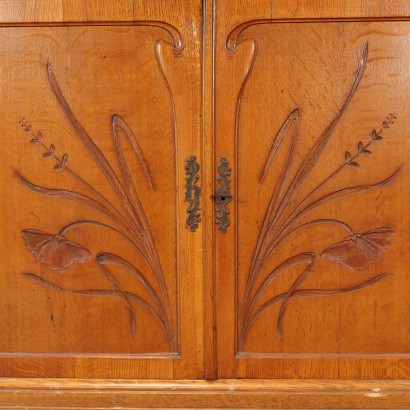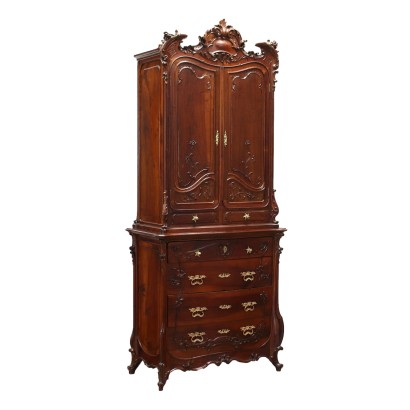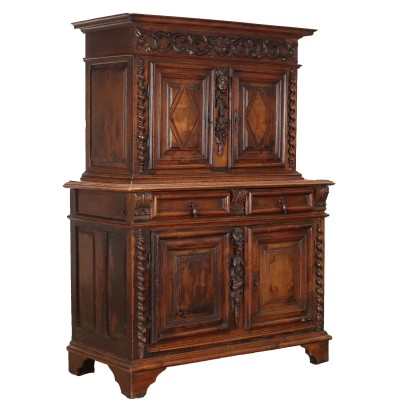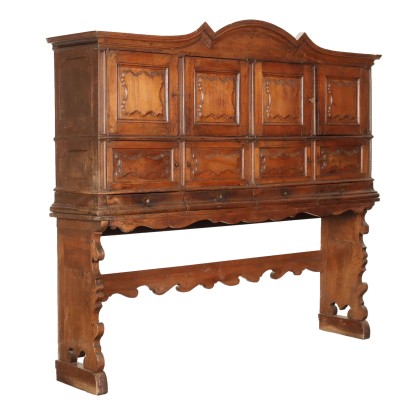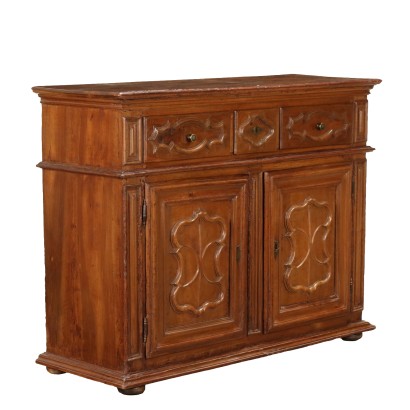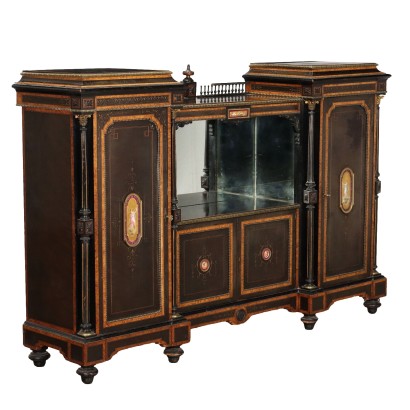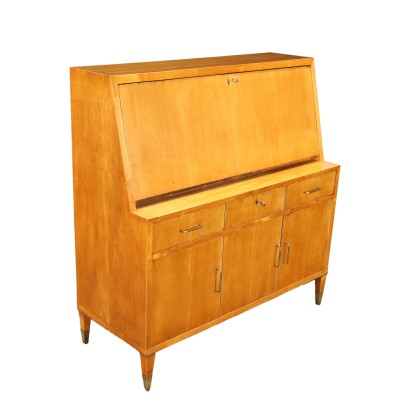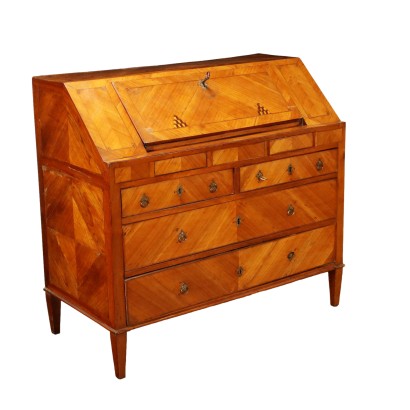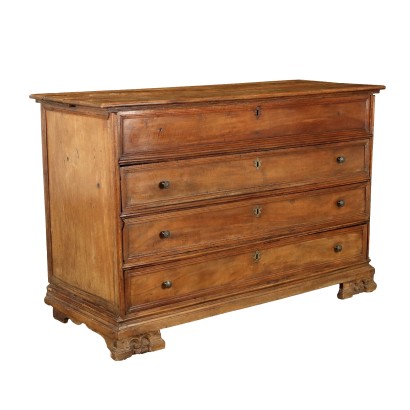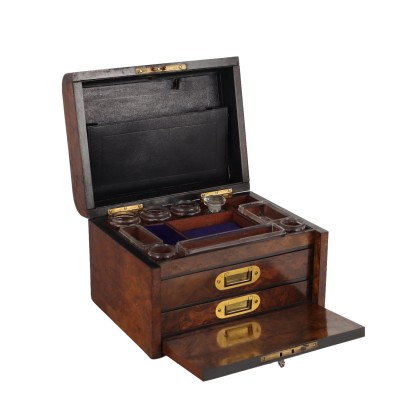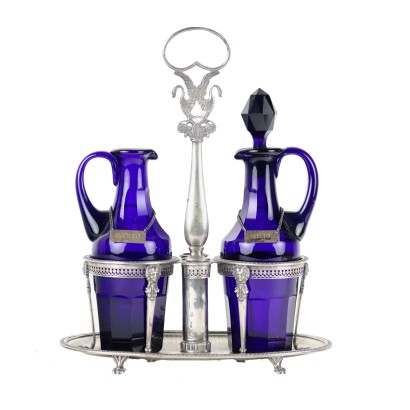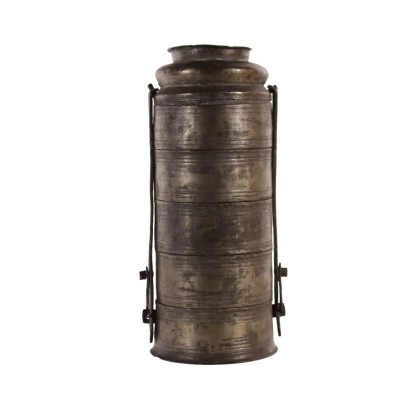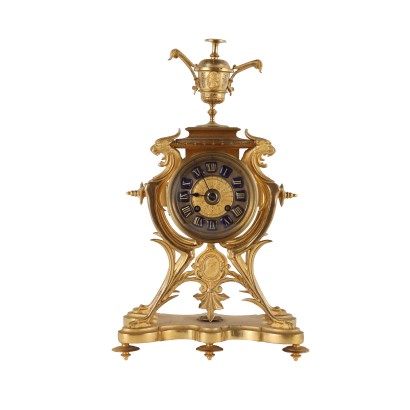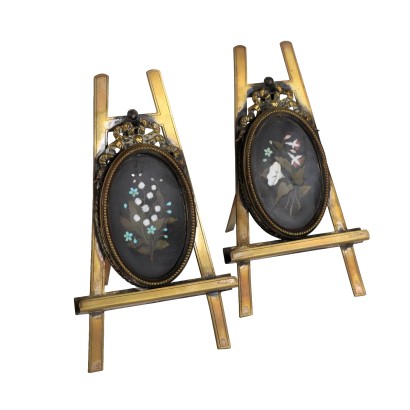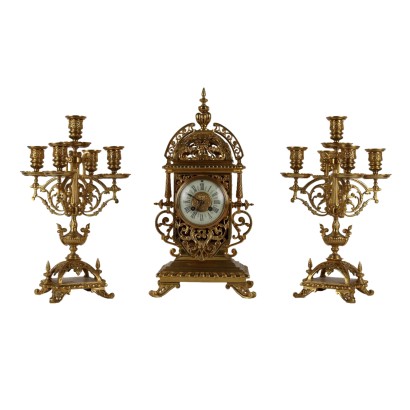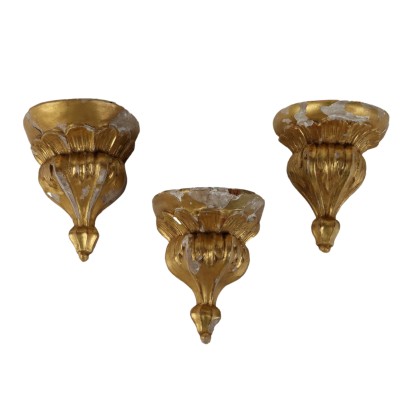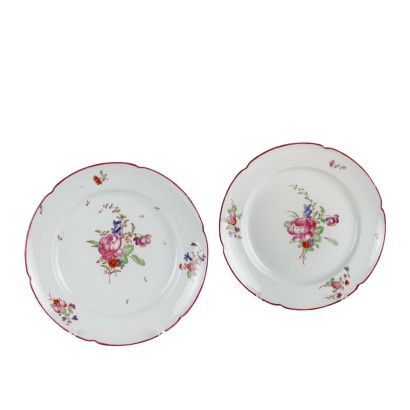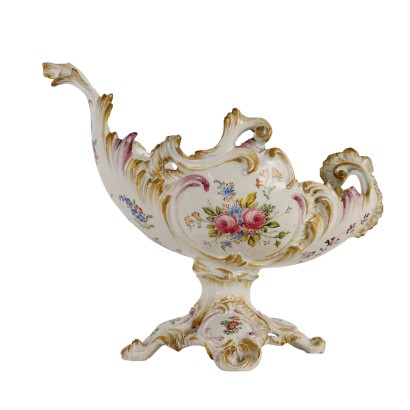Cupboard Art Nouveau Oak Italy XIX-XX Century - Italy, late 19th, early 20th century
Features
Italy, late 19th, early 20th century
Style: Art Nouveau (1890-1920)
Age: 19th Century / 1801 - 1900 , 20th Century / 1901 - 2000
Origin: Italy
Main essence: Sessile Oak
Material: Acid glass
Description
Art Nouveau cupboard in oak with upstand. Upstand supported by carved and turned uprights with carved frieze, composed of a showcase with two doors and side shelves. Lower body with four small drawers in the upper band, two central doors with decorated reserves and shelves in the side open compartments. The whole structure is decorated with carvings with whip motifs and floral decorations. The glass of the showcases of the riser is decorated with acid work with gilding.
Product Condition:
Product which due to age and wear may require restoration and re-polishing. We try to present the real state of the furniture as fully as possible with photos. If some details are not clear from the photos, what is reported in the description will prevail.
Dimensions (cm):
Height: 260
Width: 175,5
Depth: 60
Additional Information
Style: Art Nouveau (1890-1920)
Historical stylistic period formed from the end of the 19th century (ca. 1890) after the Umbertino style and continued until the First World War.The current was characterized by the floral influence and the soft and curved lines, typical example are the "whiplashes".
The first signs of this new era came from architects such as Hector Guimard (1867-1942) who created numerous buildings and hotels, but also from people such as Arthur Mackmurdo furniture designer and Arthur Liberty industrialist and London merchant of the late 19th century who began to produce furnishing fabrics with floral motifs with soft and sinuous shapes.
The Universal Exhibition of Paris in 1900 was an important point for the development and affirmation of Liberty in the following decade.
Liberty was called in different ways depending on the nation, universally known as Art-Nouveau and it is thought that Arthur Liberty is the origin of the name given in Italy to this beautiful stylistic movement.
The name Art-Nouveau is thought to derive from a shop located in Paris called Maison de l'Art Nouveau which began to show off furniture with a new and innovative design in its windows.
With the end of the First World War, the naturalistic period of Liberty ended and the Art-Decò style appeared, with more rigid and geometric lines.
Find out more about the Liberty style with our insights:
Art Nouveau: birth and development of a style
Milan Liberty between flowers and colors
Carlo Zen's Liberty
Decorative shapes and elegance in an Liberty living room
FineArt: Aeolus and Cupid, Liberty sculpture by Luca Madrassi
FineArt: Nymph and Faun, Liberty sculpture by Giuseppe Siccardi
The Austrian taste of Baroque
Age:
19th Century / 1801 - 1900
19th Century / 1801 - 190020th Century / 1901 - 2000
20th Century / 1901 - 2000Main essence: Sessile Oak
Under the name of oak or oak various types of woods derived from plants of the genus quercus are grouped. They are always resistant, hard and compact woods. Oak is lighter than oak, both are used for more rustic furniture or for the interiors of French and English antique furniture. In other processes it was gradually replaced by the advent of exotic woods considered more valuable since the 18th century.Material: Acid glass
Other customers have searched:
Credenza, mobile da cucina, armadio, stipo, dispensa, madia..
Ecco qualche spunto dal nostro blog e da FineArt per scoprire di più sul tema credenze:
Leggi di più
Una credenza che dialoga con il passato
Credenza doppio corpo, tesoro di intagli e decorazioni
Piccolo stipo, grande arredo
Stipo toscano a cavallo tra XVI e XVII
Credenza Barium di Luciano Frigerio
Credenza, Mathieu Befort Jeune, Parigi, terzo quarto XIX secolo
Mobile anni '60
Highboard '503' Gianfranco Frattini per Bernini
Mobile bar anni '40
Mobile Bar anni '40 '50, manifattura italiana
Sull'antiquariato in generale dai un'occhiata anche a:
Classic Monday: da un pezzo dei nostri magazzini alla storia dell'antiquariato
L'antiquariato dalla A alla Z: il Dizionario dell'Antiquariato
Il dizionario dell'antiquariato - Lastronatura
Il dizionario dell'antiquariato - Mascherone
Il dizionario dell'antiquariato - Natura morta
Il dizionario dell'antiquariato - Opificio
Il dizionario dell'antiquariato - Pastiglia
Il dizionario dell'antiquariato - Savonarola
Il dizionario dell'antiquariato - Rosone
Leggi di più
Una credenza che dialoga con il passatoCredenza doppio corpo, tesoro di intagli e decorazioni
Piccolo stipo, grande arredo
Stipo toscano a cavallo tra XVI e XVII
Credenza Barium di Luciano Frigerio
Credenza, Mathieu Befort Jeune, Parigi, terzo quarto XIX secolo
Mobile anni '60
Highboard '503' Gianfranco Frattini per Bernini
Mobile bar anni '40
Mobile Bar anni '40 '50, manifattura italiana
Sull'antiquariato in generale dai un'occhiata anche a:
Classic Monday: da un pezzo dei nostri magazzini alla storia dell'antiquariato
L'antiquariato dalla A alla Z: il Dizionario dell'Antiquariato
Il dizionario dell'antiquariato - Lastronatura
Il dizionario dell'antiquariato - Mascherone
Il dizionario dell'antiquariato - Natura morta
Il dizionario dell'antiquariato - Opificio
Il dizionario dell'antiquariato - Pastiglia
Il dizionario dell'antiquariato - Savonarola
Il dizionario dell'antiquariato - Rosone











